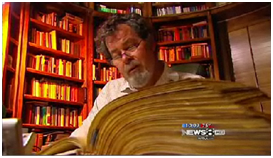In honor of Holy Saturday, here is a good interview with N.T. Wright regarding the resurrection of Jesus.
Below is an excerpt…
=====================
At the National Pastors Conference in San Diego, PreachingToday.com’s Brian Lowery got to interview N. T. Wright about his latest book—Surprised by Hope: Rethinking Heaven, the Resurrection, and the Mission of the Church—and how it relates to preaching. Since we are all in the midst of the Easter journey, his words are timely, challenging, and above all else, hopeful.
Preaching Today: In your book Surprised by Hope, you talk about a deeper understanding of hope “that provides a coherent and energizing basis for work in today’s world.” How has that deeper understanding influenced your preaching through the years?
Bishop N. T. Wright: [Studying] the Resurrection for an earlier book, Resurrection of the Son of God … ended up rubbing my nose in the New Testament theology of new creation, and the fact that the new creation has begun with Easter. I discovered that when we do new creation—when we encourage one another in the church to be active in projects of new creation, of healing, of hope for communities—we are standing on the ground that Jesus has won in his resurrection.
New creation is not just “whistling in the dark.” It’s not a kind of social Pelagianism, where we try to improve things by pulling ourselves up from our own bootstraps. Because Jesus is raised from the dead, God’s new world has begun. We are not only the beneficiaries of new creation; we are the agents of it. I just can’t stop preaching about that, because that is where we’re going with Easter.
For me, therefore, there’s no disjunction between preaching about the salvation which is ours in God’s new age—the new heavens and new earth—and preaching about what that means for the present. The two go very closely together. If you have an eschatology that is nonmaterial, why bother with this present world? But if God intends to renew the world, then what we do in the present matters. That’s 1 Corinthians 15:58! This understanding has made my preaching more challenging to me, and hopefully to my hearers, to actually get off our backsides and do something in the local community—things that are signs of new creation. (more…)


